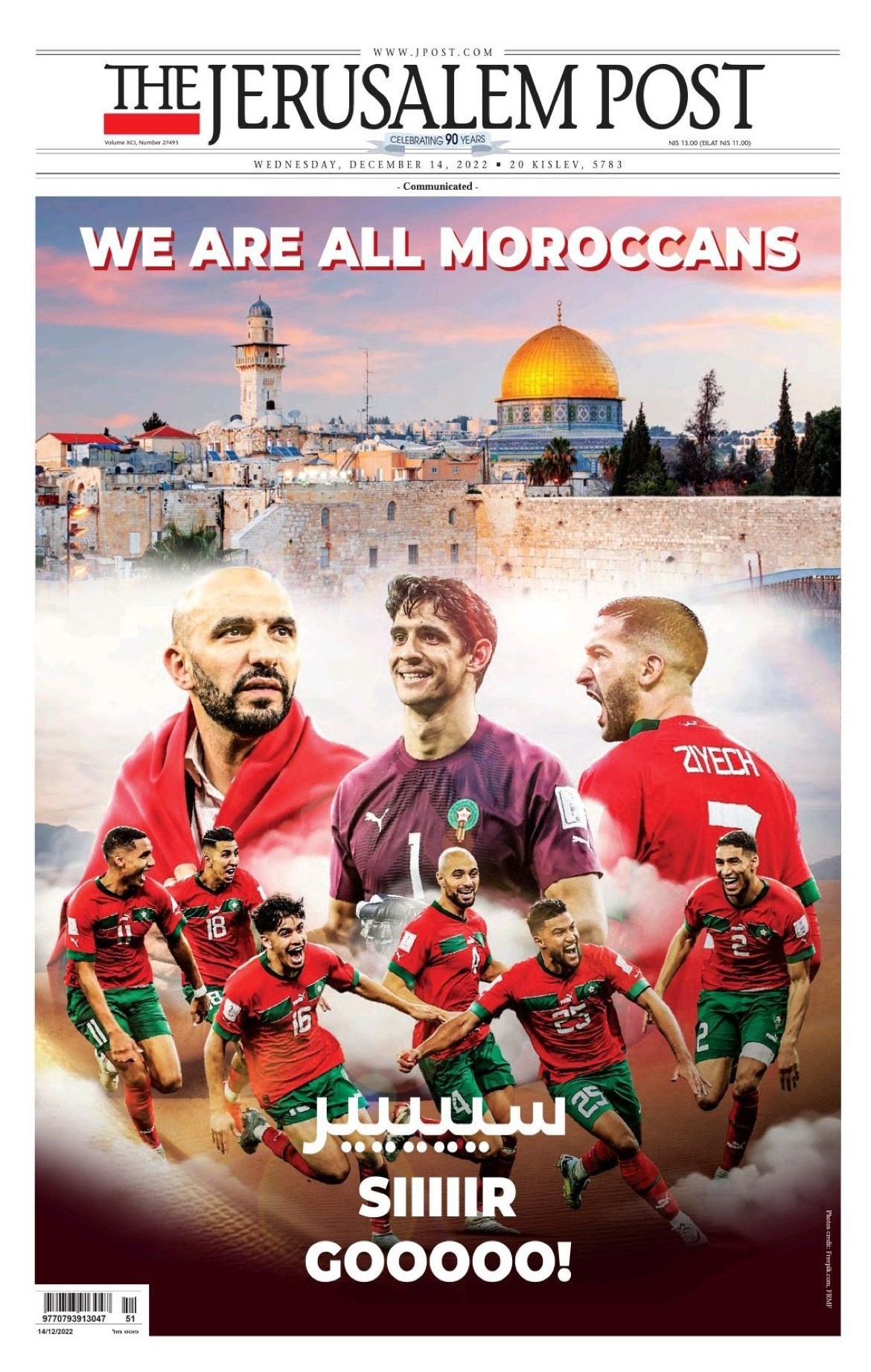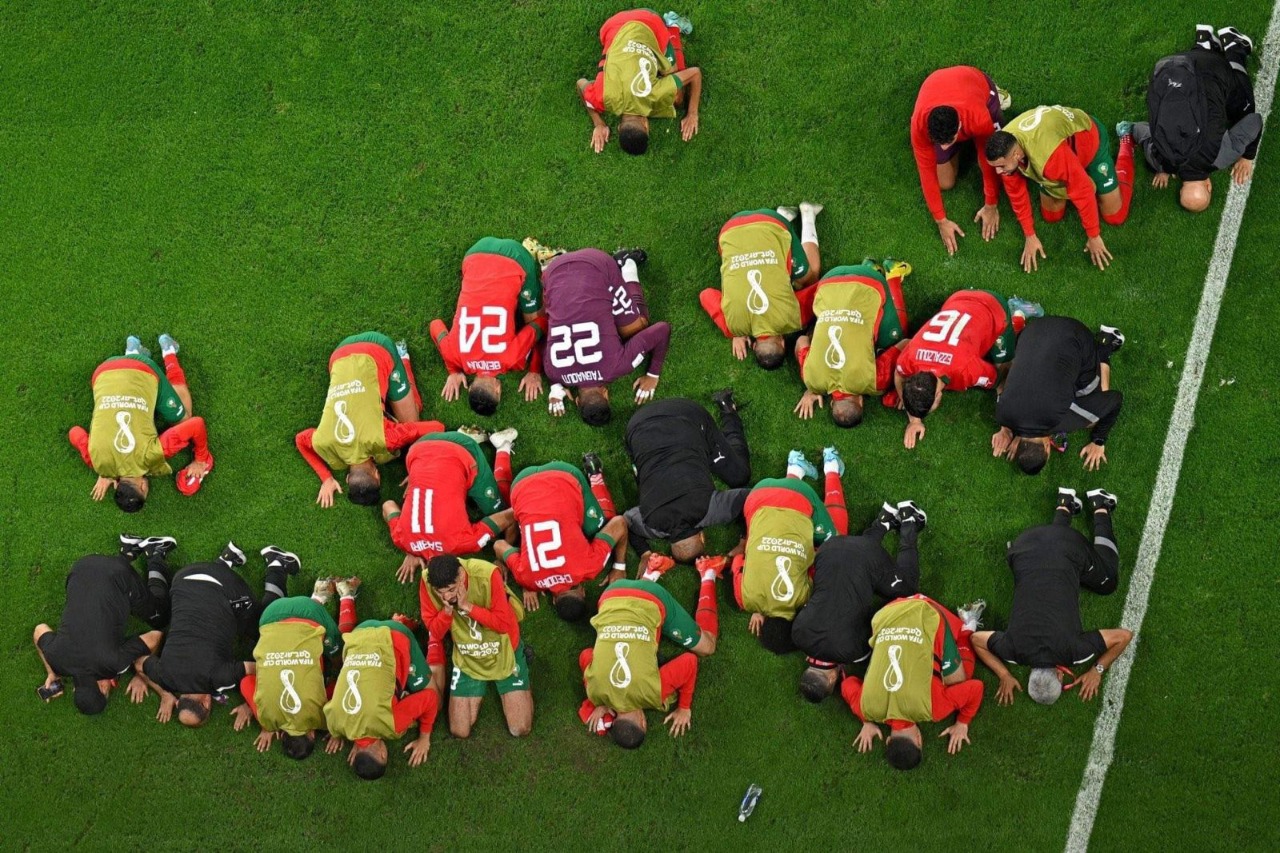To Hit Identity and Religion Together, Why Did Germany Attack Morocco in the Qatar World Cup?

After their football team left the World Cup Qatar 2022 early, as it devoted itself to supporting homosexuality at the expense of focusing on football, some of the German media began attacking the Moroccan national team because of its players’ support for morals and raising the Palestinian flag.
The German national team players began their first match in the World Cup by putting their hands on their mouths in protest against Qatar’s moral position against homosexuality to quickly get knocked out of the group stage after their match with Japan.
On the other hand, the Moroccan national team players sought in every match to win with new morals, from supporting Palestine and raising its flag, and their remarkable interest in their families and mothers, in addition to achieving resounding spherical victories that pushed them to the golden square for the first time at the Arab and African levels.
This prompted Germany to respond to the positions of the Moroccan national team by trying to tarnish its image, which prompted the followers to recall the position of the people of the Prophet of God, Lot, which came in the Almighty’s saying: “But his people gave no other answer but this: they said, Drive out the followers of Lut from your city: these are indeed men who want to be clean and pure!”
German Annoyance
In reaction to the exit of its national team and the victories of Morocco, Axel Springer SE, the largest newspaper publishing and distribution company in Germany, which is full of Zionist lobbies, claimed that raising the Palestinian flag in Qatar stadiums is anti-Semitic.
German newspaper Taz published an article on its first pages on December 10, 2022, titled Morocco is not Palestine, in which the newspaper attacked the Palestinian cause and the great Qatari and Arab solidarity with it.
German news channel WELT also published a report on December 12, criticizing the celebration of the Moroccan players by raising their forefinger, asking: “Do they know that it is a sign belonging to members of ISIS?”
In reaction to the latest news, Moroccan blogger and media activist Abdel Mouniemm Bedoury wrote on his Facebook page, “The news is not a joke... It seems that the Germans have lost their minds.”
Bedoury published the headline used by the German channel for its news, which stated: “The World Cup in Qatar: Scandal in Morocco! This picture shows three players saluting ISIS.”
On his part, Al-Mahdi Dabra, a Moroccan immigrant residing in Germany, reviewed in a post on Facebook the aspects of pressure exerted by Europe and the German press on Morocco due to raising the Palestinian flag after each match.
Dabra said, “the German press described the matter as explicit anti-Semitism and asked for clarification from the official authorities, and wondered if Morocco was in Palestine to raise its flag?”
He added that “the German press also asks why did FIFA threaten to punish the German national team goalkeeper if he raised the LGPTQ flag and did not punish the Moroccan national team players who raised the Palestinian flag?”
He said that a German journalist said that the World Cup in this edition was attended by 33 countries, not 32, referring to Palestine, accusing Qatar of supporting terrorism.
Successive Events
In his interaction with these headlines, an Arab journalist working for Deutsche Welle confirmed that “the development of the attack on Morocco began gradually, as the beginning was by talking about it as the first Arab African country to reach this level, especially since it brought down major European countries.”
He said to Al-Estiklal, preferring not to reveal his name for personal considerations: “Then an article was published in Taz newspaper, which talked about raising the Palestinian flag by Moroccan players, which saw that FIFA deals with double standards in the matter, because it rejects what is political, but it did not prevent raising the Palestinian flag.”
“Then, the discourse of these platforms evolved, especially through social media, to say that carrying the Palestinian flag is anti-Semitism, given that it contains denial of Israel in general, and therefore, in their view, the matter has become a crime that requires punishment and legal accountability,” he continued.
“What angered these platforms and those behind them is that all Arabs went out in German and European cities to celebrate the results achieved by the Moroccan team, and they were carrying the Moroccan and Palestinian flags,” the source said.
“These symbolic images do not appeal to the Zionist lobby and its followers in Germany and throughout Europe, because it reflects a beautiful face of the unity of the Arab nation, which created in this lobby fear that the Arabs would regain their historical awareness that they are one living body,” he said.
These lobbies, according to the Arab journalist, believe that the Arab conscience is still alive despite the events that took place in the region, including the decline in the millions of marches in support of Palestine, which confirms that awareness continues among young and old, but also at the international level, through foreigners belonging to Western countries.

Horns of Occupation
In a remarkable article, the sports reporter for Taz newspaper, Martin Rees, wrote that “we should rejoice for the Moroccan national team for the level it shows in the World Cup,” adding: “But adding an anti-Semitic twist to Joy makes things difficult.”
“How can we not be happy because Morocco has one of the eight best football teams in the world,” he said.
He praised the arrival of a team from outside the European continent and from South America to an advanced stage in the World Cup.
“Moreover, a North African team succeeded in eliminating one colonial country after another: Belgium in the first round, Spain in the round of 16, and then it was Portugal’s turn,” he added.
Rees believed that “Moroccan success has been added to a great deal of the symbolism of Palestine, as the Moroccan team raised the Palestinian flag after its victory over Spain and then Portugal.”
For the writer, “from a political point of view, the Palestinian-Israeli conflict in Qatar is being used to assert Arab unity.”
The writer expressed his dissatisfaction with what he saw as a historical precedent for the transparent pro-Palestine propaganda that characterizes the World Cup.
To illustrate this West German approach, Watan Serb website (issued from America) mentioned that “after the failure of the massive campaign launched by the Western media against Qatar hosting the World Cup under allegations of human rights, and its refusal to raise slogans in support of homosexuality.”
The German press resorted to creating a new reason for incitement against Doha, especially after the German national team’s humiliating defeat and its departure from the tournament in the group stage.
“The great and broad solidarity of the Arab teams with the Palestinian cause, which was made possible by Qatar under the leadership of its Emir Sheikh Tamim bin Hamad Al Thani, seemed like a new pretext for the German press to launch a new attack on Qatar and its leadership,” he said.
After the website reviewed what was reported by the Taz journalist, it confirmed that “there is hardly a match from the Qatar World Cup matches without the present masses raising the flag of Palestine and wearing the Palestinian keffiyeh, and chanting slogans and chants in solidarity with the Palestinian people.”
In a series of tweets he posted on Twitter, the managing editor of political affairs in the German newspaper Bild, Julian Ropcke, expressed his annoyance at FIFA’s decision not to allow players to carry homosexual badges and flags in the World Cup in Qatar.
He claimed that the Palestinian flag is the flag of a non-existent state, describing the demands of the Palestinian people to liberate their land from occupation as a desire to throw millions of Jews into the sea, as he claimed.
Ropcke was not satisfied with that but rather published tweets that were an explicit incitement against some Arab academics who work in German universities simply because they published pamphlets sympathetic to Palestine and proud of raising the Palestinian flag in stadiums, accusing them of anti-Semitism.

Embarrassing Reality
There is no doubt that “Israel” was confused by the Arab mass rally around the Palestinian cause in the World Cup in Qatar, as the Israeli journalist, Michal Aharoni, headlined her article in the Israel Hayom newspaper with the phrase: “All the Palestinians in Qatar, the reality is embarrassing.”
In it, Aharoni talked about a state of Palestinian superiority during the World Cup, adding in a message she sent to the Israeli community: “Here we are discovering that there is a vibrant Palestinian people, and to realize this, the Israeli media had to fly to Qatar to remember this fact.”
“These are the feelings expressed by ordinary people or officials alike. Some of them identified themselves as Palestinians…and some of them simply remember their relationship with the Palestinian people, unlike us, the Israelis, who originally forgot that there are people behind the Green Line,” the Israeli writer wrote.
The Arab journalist working for Deutsche Welle confirmed that “the general German public opinion was not convinced of the media discourse inciting against Morocco and Muslims, and the indications given to carrying the Palestinian flag or raising the players’ index finger.”
He emphasized to Al-Estiklal that “this rejection was evident in the spread of the hashtag #zeigdeinfinger on December 12, which garnered more than 65 million interactions in a few hours.”

About the backgrounds that made the German media move in this direction, the Arab journalist said that “the reason lies in the symbols, because Morocco today presents these cultural, human and civilizational symbols through its players and in the World Cup that the whole world is watching.”
“The matter is something of a clash of civilizations and cultures, as demonstrated by the American political scientist Samuel Huntington, and before him the Moroccan futurist Mahdi Elmandjra,” he said.
“The aim of this unjustified behavior, and the exposed propaganda, through which the transition from sports to politics was made crudely, is to destroy the beautiful image of the Moroccan team, which has gained a great momentum of support and sympathy in Germany, specifically at the popular level,” he added.
“The fear that dwells in those in charge of the media affairs in Germany, and behind them the Zionist lobbies and others, is represented by the fear of the size of the public follow-up to these symbols, with what it means of reverence and glorification of family and mother values, the meanings of parental appreciation, and supporting the Palestinian cause,” he stressed.
In conclusion, the Arab journalist says, “What the German media is doing is seeking to distort everything related to the Islamic religion, because the depth of the problem they have is with religion itself. Therefore, they do not say this directly, but rather hide behind fake and enveloping human rights narratives and slogans, to hit identity and religion together.”
Sources
- Morocco is not in Palestine [German]
- German media accused of racism over Morocco celebration claims
- World Cup 2022: Outcry over German news outlet's 'racist' Morocco coverage
- Morocco football team: German media airs Islamophobic comments; Israeli daily shows support
- World Cup Qatar 2022.. Did Palestine defeat Israel? [Arabic]











